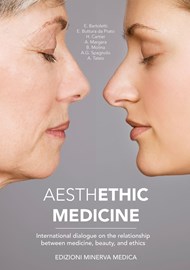This landmark publication presents a compelling, multifaceted dialogue on the evolving ethical landscape of aesthetic medicine. Curated by an esteemed panel of international experts, it provides a much-needed exploration of how aesthetic practice must adapt in response to technological advancements, shifting cultural norms, and changing societal expectations.
Notably, from the outset, the authors emphasise that this is the beginning of an ongoing conversation, a journey of communication rather than a prescriptive or finalised guide.
Chapter overview
The Scenario: The Ethical Evolution of Aesthetic Medicine (Antonio Gioacchino Spagnolo)
This section offers a profound reflection on the ethical principles underpinning aesthetic medicine, tracing their evolution from Hippocratic ideals to contemporary bioethics. It urges practitioners to prioritise the psychophysical balance of the individual, not mere beautification, rather anchored in the principles of beneficence, respect for autonomy, and justice.
The Diagnostic and Therapeutic Protocol of Aesthetic Medicine (Emanuele Bartoletti)
Bartoletti outlines the scientific rigour required in aesthetic medicine, reminding readers that this is foremost a medical discipline. He proposes a comprehensive diagnostic protocol encompassing psychological, metabolic, postural, and dermatological assessments. That sets a new benchmark for ethical, patient-centred care. His approach is one that all clinicians should strive to integrate into their consultation structures.
Study on Ethics in Aesthetic Medicine: Opinions of Global Professionals
This global survey reveals both the diversity of aesthetic practices and a shared commitment to ethical integrity. Despite cultural and regional differences, there is a universal desire to embed ethics at the core of aesthetic medicine.
Regenerative Medicine and the Multidisciplinary Nature of Treatments (Antonello Tateo)
Tateo offers a thoughtful examination of how regenerative therapies are reshaping the field. He advocates for interdisciplinary collaboration and for tailoring treatments to the patient’s biological profile rather than relying solely on prescriptive aesthetic norms. Particularly noteworthy is his discussion of hyaluronic acid. Not merely as a hydrating filler but as a bioactive regenerative tool. His insights into high-concentration cooperative hybrid complexes (HCCs) highlight their potential for dermal remodelling and collagen stimulation, providing substantial clinical value for forward-thinking practitioners.
Sustainability of Treatment and Listening to Patients (Editta Buttura da Prato)
This chapter emphasises the moral imperative of truly listening to patients. It highlights the centrality of education, informed consent, and shared decision-making in the practitioner-patient relationship. Buttura da Prato underscores the ethical responsibility inherent in treating the face, an exposed, public, and emotionally significant part of the body. The aesthetic doctor’s mission, she argues, is to enhance without distorting.
The International Perspective and Patient Satisfaction as the Physician’s Goal (Beatriz Molina)
Dr Molina asserts that genuine patient satisfaction stems from ethically sound, well-judged interventions, not from over-promising or excessive procedures. She addresses the lack of regulation in the UK compared to stricter frameworks in countries like Italy, France, and Spain, where only licensed medical professionals may perform aesthetic treatments. Despite some legislative progress in the UK, such as banning injectables for minors and introducing licensing proposals, public awareness around safety and qualifications remains alarmingly low. Molina then explores global aesthetic standards shaped as much by cultural and socioeconomic factors as by science. From the regenerative minimalism favoured in Northern Europe, to the more sculptural, body-focused interventions of Brazil, and the harmony-centric enhancements seen in East Asia, she reminds us that "beauty" is not a universal ideal but a deeply contextual expression. The role of the aesthetic doctor is to educate, guide, and co-create results that are medically sound, culturally sensitive, and psychologically empowering.
Aesthetic Medicine in the Time of Social Media (Hugues Cartier)
Cartier presents an interesting critique of how social media can distort both patient expectations and professional conduct. He calls for clearer ethical boundaries and greater accountability in our online presence as medical professionals.
The Need to Define a Code of Ethics (Andrea Margara)
Margara makes a compelling case for the formalisation of ethical guidelines to protect patients and uphold the credibility of the specialty in this rapidly changing aesthetic environment.
The Ethical Dimension in the Role of the Aesthetic Doctor (Antonio Gioacchino Spagnolo)
This closing reflection reaffirms the aesthetic doctor’s dual duty, to safeguard both the biological and emotional wellbeing of their patients. Practitioners must be prepared to resist demands that compromise ethical care, prioritising honesty and safety above all.
Principles of Ethical Behaviour for Aesthetic Medicine Professionals: The 6 Key Words
The work concludes with a distilled ethical manifesto built around six core principles: Education, Trust, Harmony, Identity, Care, and Safety. A clarion call for a more conscientious and principled future in Aesthetic Medicine.
Final reflections
This book is more than a position paper; it is a foundational blueprint for the ethical practice of aesthetic medicine moving forward. It challenges us to harmonise innovation with responsibility, commercial realities with compassion, and technical excellence with moral integrity. As an aesthetic doctor practicing in London’s diverse and demanding environment, I found this dialogue both inspiring and deeply relevant. It is a powerful reminder that our true artistry lies not only in the results we create, but in the ethical standards we choose to uphold.





